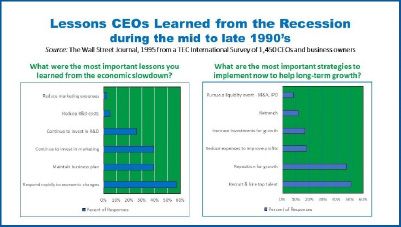Law firms, lawyers and other professionals can learn from past economic downturns.

Table of contents
There are many useful and inspirational lessons to learn about how law firms and other organizations have successfully weathered prior economic storms, then survived and thrived.
As the writer and philosopher George Santayana said in 1905, “Those who cannot remember the past are condemned to repeat it.”
Forged in Crisis
Harvard Business School Professor Nancy F. Koehn is the author of the highly rated book, “Forged in Crisis: The Power of Courageous Leadership in Turbulent Times,” which explains how five of history’s greatest leaders managed crises — and what can be learned from their experience.
In 2009, as the Great Recession was ending, The Wall Street Journal interviewed Professor Koehn on how companies had survived earlier economic storms. Below are key takeaways from the article (adapted and updated):
1. Being a natural and brilliant salesman has helped many innovators and business owners weather depressions, recessions and other economic storms.
For example, take Henry Heinz, founder of Heinz Ketchup (now a Kraft brand). Heinz figured out innovative ways to delay wages and get his employees back to work. He also renegotiated his rental contracts to reduce his rent to half price.
Even if you are not a natural-born salesman (which many lawyers and other typically introverted professionals are not), now is the time to start thinking more like an entrepreneur.
Entrepreneurship is defined this way by Howard Stevenson, professor at Harvard Business School and godfather of entrepreneurship studies: “The relentless pursuit of opportunity without regard to resources currently controlled.”
Since many professional service providers are hired and paid to find ways to eliminate, reduce, control or manage risk, becoming a full-fledged entrepreneurial thinker is not realistic. Instead, consider and take more strategic risks. But first, ask yourself, “If I was just starting my practice on my own and with limited resources, what exactly should I do to focus my business development in the most cost-efficient and effective ways?”
A related lesson is to make time to strategically think ahead and be prepared for the unexpected.
Remaining in a reactive, fear-driven panic mode often results in short-term decisions that may save money, resources or time but also may backfire or yield unintended consequences. So, it’s crucially important for all professionals to remain calm, think logically, and consider the best interests of the firm or practice in both the short and long term.
2. Don’t cut back on marketing — realign it.
A major lesson from past economic downturns is the need to market, market, market — but to do so in strategically innovative and novel ways. For example, during the Great Depression, Proctor & Gamble decided to start marketing on the radio (which was like the internet at that time). They created short audio dramas, which later helped coin the term “soap operas.”
3. If possible, don’t cut back on innovation (R&D).
Instead, strategically commit talent and resources to focus on how to do what you already do differently, better, faster and less expensively.
Few law firms have a dedicated R&D or innovation department or committee or any organized R&D or innovation effort. Instead, they rely on ideas generated every so often by firm members who happen to have the internal power and influence to get their ideas funded and implemented.
Now is the time for all law firms, lawyers and professionals to get more innovative in an organized, productive and potentially profitable manner.
4. Do business and practice with people you trust.
Treat them fairly, and when times get tough, they will be more loyal and less likely to end your relationship or back out of your project.
If there is one thing the COVID-19 pandemic should have reminded us of, it’s the importance of people. Without people, there is nothing to do, no law to practice and no accounting to be done. Nothing.
Lessons From the Mid-1990s Recession

An article published in The Wall Street Journal in 1995 summarized the findings from a survey of business leaders conducted that year. The top-five lessons from CEOs on how to survive and thrive during an economic downturn and recession were:
- Respond rapidly to economic changes.
- Recruit and hire top talent.
- Reposition for growth.
- Maintain business plan(s).
- Continue to invest in marketing.
Most law firms and other professional services firms are cash-based businesses, where cash is king and there are little (if any) retained earnings. So, the instinct to save as much cash as possible during any economic downturn is a prudent strategy. But taken too far, cutting costs to the bare bones can make you vulnerable.
According to a study published by Bain in 2019, companies that were among the eventual winners after a recession moved deliberately to capture opportunities before the recession. While they focused intensively on cost transformation, they also looked beyond cost. The winners excelled in four areas:
- Early cost restructuring
- Financial discipline
- Aggressive commercial plays
- Proactive mergers and acquisitions
Firms and companies can gain market share and profitability using the right strategy for the business cycle.
Lessons From the Great Recession
Research conducted by SunTrust in Q1-2019 of 516 businesses with annual revenue between $5 and $250 million showed that 86% of $50 million-plus public companies shrank during the 2008 recession. Yet, 14% continued to grow (at a 9% rate) by acting early, maintaining a long-term perspective and focusing on growth, not just cost-cutting.
What did that 14% have in common? They:
- Acted early.
- Took a long-term perspective.
- Focused on growth, not just cost-cutting.
As reported in Harvard Business Review, companies that have already invested in digital technology, analytics and agile business practices are usually better able to understand the economic threats of a downturn and respond more quickly. Recessions can create wide and long-standing performance gaps between companies. Research has found that digital technology can do the same.
Companies that have neglected digital transformation may find that the next economic downturn makes those gaps insurmountable.
Permanent Economic Changes That Have Affected the Legal Industry
In a survey of large law firms conducted in 2013, firm leaders admitted that clients’ demands for more predictable, transparent and reasonable pricing and increased efficiency were here to stay. Yet, firm leaders also acknowledged that internal resistance slowed their response to adapting, upgrading or changing strategies and tactics after the Great Recession.
Will the same hold true in 2023 and beyond?
To help reduce and control his company’s total spend on outside legal services, Jeff Carr, who served as general counsel for FMC Technologies from 2001-2014, created the Alliance Counsel Engagement System (ACES), a method of hiring outside counsel that emphasizes value and goals. Many other legal industry entities, firms and alternative service providers have since borrowed from the ACES model. In addition, Susan Hacket, then general counsel of the Association of Corporate Counsel and influenced by Carr’s leadership, created the ACC Value Challenge.
Nowadays, most clients continue to pressure law firms to increase spend predictability and transparency and reduce total outside legal services costs.
In response, many firms have created legal project and knowledge management departments, programs and systems to become more efficient in the delivery of legal services. Firms have also been forced to respond to RFPs that now include online reverse auctions, using automated platforms such as PERSUIT, BanyanRFP, RFP360 and others.
The need to quickly adjust, adapt and make appropriate changes is a constant, especially during challenging economic times.
This article was adapted from Julie Savarino’s popular book, “Survive and Thrive Post-Pandemic: A Guidebook for Legal and Professional Services Providers,” which contains information on business practices and disciplines that are key to the survival and growth of professional services firms, how they apply to the professional services sector, and specific ways to deploy them.

Don’t miss out on our daily practice management tips. Subscribe to Attorney at Work’s free newsletter here >





















